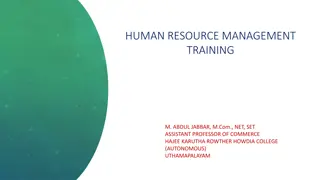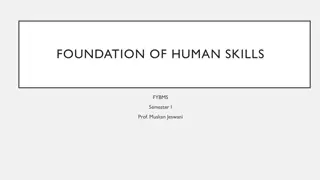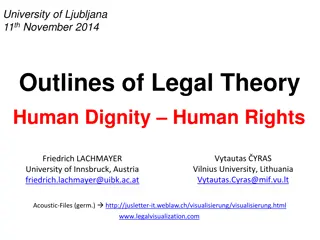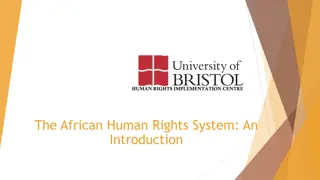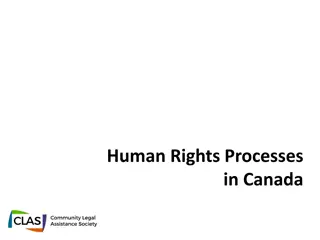An Introduction to Human Factors
Gain a comprehensive understanding of Human Factors, the multidisciplinary field that focuses on optimizing human performance and creating safer working environments. Explore the various factors that influence human behavior and learn how to apply this knowledge to improve safety, decision-making, c
14 views • 9 slides
Human Systems Integration in Technology Development
Human Systems Integration (HSI) is a crucial interdisciplinary process in systems engineering that integrates human factors to enhance system design, reduce costs, and optimize performance. This presentation by NASA experts delves into the benefits of HSI, the human readiness level metrics, and its
2 views • 23 slides
Factors Influencing Economic Growth: Human Capital and Capital Goods
Factors such as investment in human capital, capital goods, natural resources, and entrepreneurship play a crucial role in determining a country's economic growth. Human capital encompasses the skills and abilities of workers, while capital goods are the tools and equipment used to produce goods and
2 views • 28 slides
Approaches to the study of Human Rights
The Marxist perspective on human rights emphasizes social rights over individual rights, viewing the full realization of self within society. Marx connects bourgeois society with human rights, highlighting how exploitation under capitalism alienates individuals. In contrast, the Third World perspect
5 views • 19 slides
Overview of Human Factors and Automotive Standards YouTube Series
This YouTube series, led by Paul Green from the University of Michigan, covers human factors and automotive standards. It includes topics like introduction to standards, core human factors standards, automotive human factors standards, human-computer interaction standards, and SAE vehicle standards.
7 views • 9 slides
Evolution of Human-Environment Relationship Through History
The evolution of human-environment relationships can be traced through four key stages - from hunting and food gathering in early human history to the modern era of science, technology, and industrialization. Each phase reflects changing attitudes towards nature and resource utilization, highlightin
0 views • 10 slides
Importance of Training and Development in Human Resource Management
Training is defined as the act of enhancing employee knowledge and skills for specific job roles. Human Resource Management focuses on planning, acquiring, training, and developing individuals to achieve organizational objectives. Training is crucial for organizational success, enhancing employee pe
2 views • 16 slides
Comprehensive Guide to Training and Development in Human Resource Management
Training and development play a crucial role in enhancing employee skills and performance in organizations. This guide covers the meaning, importance, methods, and on-the-job training techniques such as job instruction, coaching, and apprenticeship training. It also explores off-the-job training met
0 views • 7 slides
Understanding Human Rights: Overview and Evolution
Human rights encompass various aspects such as human needs, generations of rights, individual status, and the indivisibility of rights. Dr. Anna Ledzi ska-Simon discusses the translation of human needs into rights, the historical evolution of rights across generations, individual rights according to
3 views • 17 slides
Understanding Human Rights in Queensland Government Work
The Human Rights Act of 2019 in Queensland outlines protected rights such as equality, freedom of expression, and fair trial. All public service employees must adhere to these rights, ensuring decisions and actions respect human rights. This act applies to everyone in the Queensland Government, with
2 views • 13 slides
Understanding Postdoctoral Training in Psychology
Postdoctoral training in psychology plays a crucial role in enhancing career prospects and skills development for graduate students. This training, typically lasting 1-2 years, offers specialized clinical or research training beyond the doctoral degree, increasing marketability and potential for boa
0 views • 28 slides
Illinois Sexual Harassment Prevention Training Version 2.0 by State of Illinois Department of Human Rights
Illinois Sexual Harassment Prevention Training Version 2.0 by State of Illinois Department of Human Rights emphasizes the prohibition of sexual harassment in Illinois, outlining the responsibilities of employers and providing information on what constitutes sexual harassment under the Illinois Human
0 views • 39 slides
Understanding the Basic Concept of Human Rights in Modern Jurisprudence
Human rights are natural and inalienable, essential for human life, based on universal principles. The concept of human rights is both simple and complex, requiring societal development and political will for implementation. Rooted in natural law theory, human rights have evolved from natural law to
1 views • 24 slides
Factors Affecting the Hydrological Cycle: Understanding Physical and Human Influences
The hydrological cycle is influenced by both physical and human factors. Physical factors such as relief, vegetation, basin size, rock type, soil type, and climate all play a role in shaping the movement of water through the cycle. Human activities like forestry, urbanization, deforestation, mining,
2 views • 20 slides
Overview of Saddleback College Human Services Program 2023
Providing insight into the 12th Annual Human Services Information Session, the program overview, academic counseling, pursuit of higher education, certification processes, and the dedicated Human Services Team at Saddleback College. The session explores the significance of social and human service w
2 views • 31 slides
Understanding Media Ecology: Impact of Communication Technology
Media ecology is a theoretical concept analyzing the influence of media and communication technology on human culture. Neil Postman, a prominent figure in the field, delves into how communication media affect human perception, understanding, and values. This study views media as environments shaping
4 views • 23 slides
Training Course on Human Rights at International Borders
This training course focuses on human rights at international borders, emphasizing the importance of a human rights-based approach to border security and management. Participants will learn about key concepts, rights of migrants, due process, gender-responsive approaches, and more. Through reflectiv
1 views • 16 slides
Enhancing Operating Department Human Factors Training for Improved Theatre Safety
This study focused on maximizing the impact factor of multidisciplinary operating department human factors training through simulation in the operating theatre. The methods included simulations, group discussions led by consultant surgeons, and feedback questionnaires. Observations highlighted theme
1 views • 4 slides
The Critical Role of Human Capital in Economic Growth: A Review
Literature highlights the significance of human capital formation in driving economic growth and achieving macroeconomic objectives. Human capital accumulation enhances productivity, reduces unemployment, poverty, and inequality, underscoring the need for investments in education, health, and job tr
0 views • 25 slides
Understanding Human Nature and Individual Differences in Foundation of Human Skills
Explore the foundational concepts of human behavior, individual differences, and organizational culture in the study of human skills. Delve into topics such as human nature, personality, attitudes, intelligence, and learning in Prof. Muskan Jeswani's course. Understand the significance of inter- and
0 views • 11 slides
Importance of Human Factors in Patient Safety: A Pharmacy Technician's Deadly Mistake
Applying human factors is crucial for patient safety, as demonstrated by the tragic case of Emily Jerry, a two-year-old girl who lost her life due to a pharmacy technician's deadly mistake in preparing a chemotherapy solution. The oversight and miscommunication between healthcare professionals led t
0 views • 13 slides
Integrated Education & Training Technical Assistance: Building Effective Training Objectives
In this session, the focus is on creating a single set of learning objectives for an Integrated Education & Training program. The importance of measurable training objectives and their role in achieving program goals are discussed. Tips are shared on enhancing training effectiveness, emphasizing wor
0 views • 23 slides
Exploring Factors in Closing the Differential Attainment Gap in Post-Graduate Specialty Training
This research delves into the factors contributing to an absence of an ethnic attainment gap in post-graduate specialty training. It highlights the complexities and impacts of the attainment gap, aiming to identify key factors for fairer training pathways, ultimately aiding in reducing observed diff
3 views • 26 slides
Understanding Human Behavior: Insights for Social Workers
This material delves into the intricacies of human behavior, exploring factors influencing behavior such as heredity, environment, intelligence, needs, and motives. It covers the concept of human behavior, stages in life from conception to old age, and theories of human development by eminent psycho
2 views • 71 slides
Evolution of Human Rights: From Ancient Times to Modern Era
Throughout history, ideas of rights and liberty have evolved, leading to the recognition of universal human rights in the modern sense. The concept of human rights can be traced back to significant historical events such as the English Bill of Rights, the Virginia Declaration of 1776, and the French
0 views • 7 slides
Impact of Correlation on Human Reliability Analysis
Understanding the impact of correlation between Performance Shaping Factors (PSFs) on their multipliers in the context of Human Reliability Analysis (HRA), particularly focusing on the SPAR-H method. The correlation among PSFs, such as stress, complexity, and training, is evaluated to determine how
1 views • 25 slides
Effective Training Manual for Integrating People with Disabilities into the European Labour Market
This comprehensive training manual provides guidance for trainers on implementing the innovative JobCircuit model by PhoenixKM, Belgium. It covers didactic guidance, planning and preparing training sessions, facilitating engaging training environments, and evaluating training impact. The manual outl
0 views • 20 slides
Ecological Factors and Climatic Influences on Plant Life
Ecological factors play a crucial role in shaping the environment for organisms to thrive. This includes living (biotic) and non-living (abiotic) components like climatic factors, edaphic factors, topographic factors, and biotic factors. Climatic factors such as light, temperature, water, wind, and
0 views • 14 slides
The Link Between Democracy and Human Rights
The core of democracy lies in promoting equal human worth and self-determination. There is a strong connection between human rights, democracy, good governance, and development. Democracy allows people to participate in decision-making, ensuring their views are heard. It upholds freedom, equality, f
0 views • 15 slides
Capacity Building and Training for Extension Workers and Farmers
Capacity building involves compulsory training and skills development for extension workers and farmers, along with effective reward systems. Training is essential for individuals to acquire new skills and knowledge, fitting them for their roles. The process includes developing competencies required
0 views • 18 slides
Understanding Factors and Prime Factors in Mathematics
Explore the concept of factors and prime factors through practical scenarios involving Jedward, stationary supplies, and school choirs. Learn how to find factors of numbers like 18 and 30, identify prime numbers, write numbers as products of prime factors, determine common factors, and calculate low
0 views • 19 slides
The Significance of Human Rights in the Modern World
Human rights are fundamental rights that belong to all individuals, are inalienable, indivisible, interconnected, and should be respected without prejudice. The Universal Declaration of Human Rights, adopted in 1948 after WWII by the United Nations, is a crucial milestone document emphasizing human
0 views • 5 slides
Federal Aviation Administration Subcommittee on Human Factors Fall 2015 Review
This document discusses the review of flight deck and maintenance systems integration human factors by Kathy Abbott in September 2015. It outlines the purpose, benefits, and success factors of the BLI Portfolio Overview related to human factors in aviation operations. Furthermore, it presents core f
0 views • 10 slides
Enhancing Transparency in Human Rights Performance Measurement
This information focuses on initiatives like the Human Rights Measurement Initiative (HRMI) that aim to provide new data for researching and advocating human rights issues globally. The HRMI project, founded in 2015, collaborates with various stakeholders and is funded by philanthropic grants. It em
0 views • 19 slides
Outlines of Legal Theory Human Dignity – Human Rights
Explore the significance of human dignity and human rights within legal theory, reflecting on their cultural, moral, and legal implications. Delve into the essence of human rights as an essential cultural achievement, contrasting the protection and denial of human images within different legal conte
0 views • 10 slides
Understanding Human Rights: Module 1 Overview
This module serves as an introduction to human rights principles, instruments, and monitoring mechanisms. It covers the definition of human rights, the Universal Declaration on Human Rights, key principles, and state obligations. Human rights are universal legal guarantees that protect individuals a
0 views • 21 slides
International Focus Programme: Human Rights and Technology Advocacy
The International Focus Programme (IFP) is actively engaging in advocating human rights and technology through various initiatives and campaigns. This includes organizing online meetings, webinars, surveys, and events to raise awareness about freedom of expression online, artificial intelligence, an
0 views • 8 slides
Overview of Human Resources Questions in GLAAS 2018/2019 Cycle
This section provides an overview of the three questions related to human resources in the GLAAS 2018/2019 cycle. It covers topics such as human resources needs assessments, WASH training institutions/programs, and human resources for WASH operations and development. The content explores how needs a
0 views • 16 slides
Overview of the African Human Rights System
The African Human Rights System encompasses various key elements such as the Organisation of African Unity, African Charter on Human and Peoples' Rights, African Court on Human and Peoples' Rights, African Union, and additional human rights-related treaties and protocols. This system aims to protect
0 views • 19 slides
Human Rights Processes in Canada: Legislation and Protections Explained
Understand the human rights processes in Canada, including the two general sources of human rights, human rights legislation, federal vs. provincial/territorial laws, and the specifics of the BC Human Rights Code. Learn about direct and indirect discrimination, duty to accommodate, and the areas pro
0 views • 12 slides






